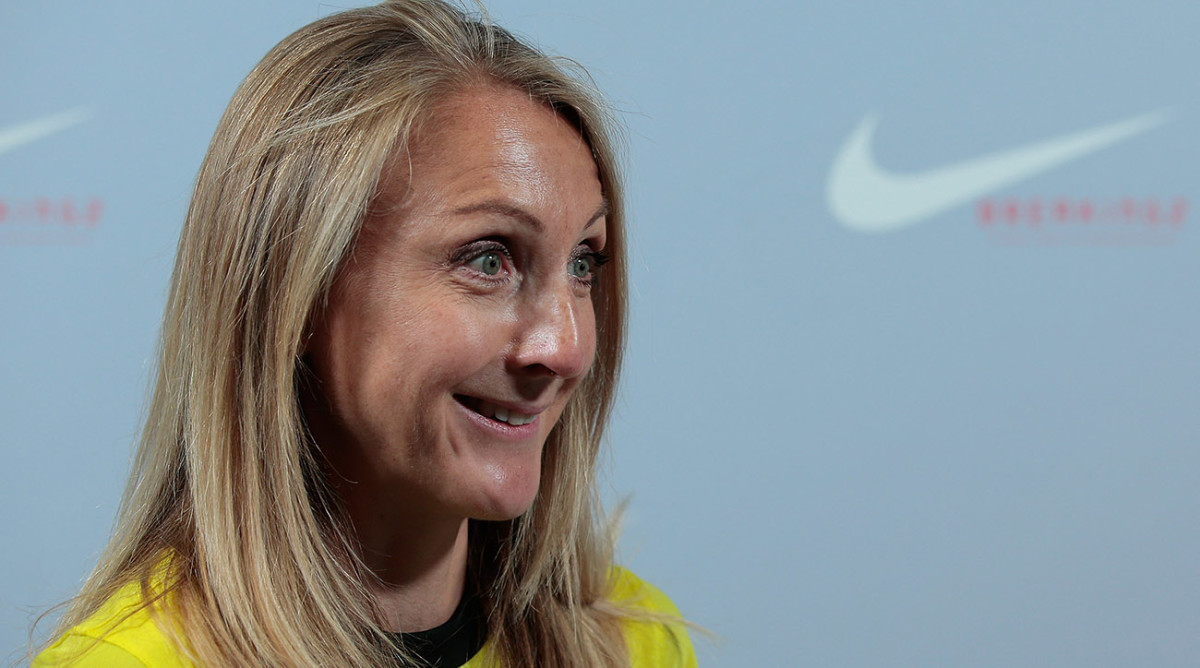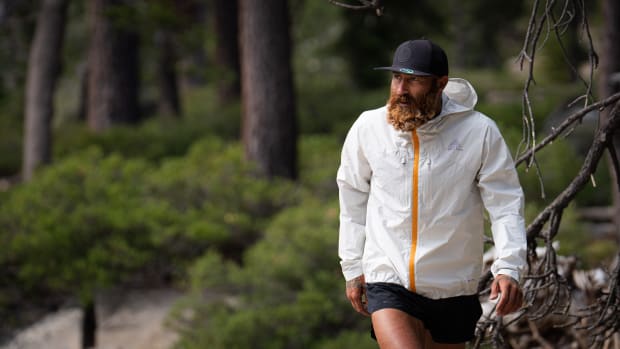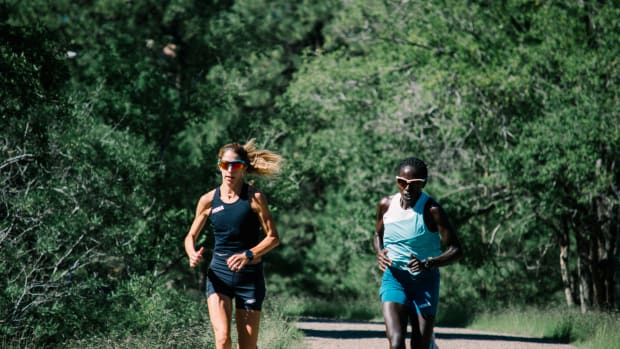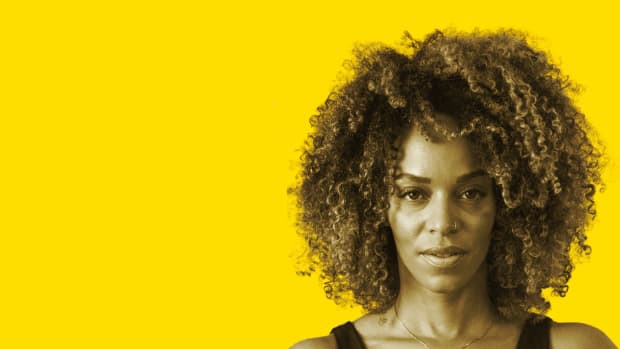Paula Radcliffe Talks Women's Marathoning, World Records and More
The list of the fastest marathons run by women has seen several changes in 2017. In April, Mary Keitany clocked a women’s-only marathon world record of 2:17:01 with Tirunesh Dibaba coming in less than a minute behind at 2:17:56 for second place. Dibaba followed that performance up with a 2:18:31 to win the Chicago Marathon on Sunday morning. The only woman ahead of them on the all-time list is Paula Radcliffe, whose 2:15:25 has stood as the world record since 2003.
Radcliffe, 43, is no longer racing competitively and serves as an analyst for major races with BBC. Sports Illustrated caught up with Radcliffe over the weekend to discuss state of women’s marathoning, the Breaking2 attempt and more.
SI: How’s retirement been treating you and how much running are you still doing nowadays?
Paula Radcliffe: I pretty much still run every day. It’s just not structured training. I kind of just use it as a way to clear my head or social running with friends or even my kids. I’ve just been able to stay fit and enjoy running. Obviously, there’s a part of me that would love to still be able to compete as an elite runner but I know that I’m not able to do that. Being invited back to races and watching from the front row, it is really special and I can still appreciate what a great sport it is through the performances of others.
SI: You had the a series of foot injuries that really changed the end of your career. You came back in 2015 to give it one last run at the London Marathon. Was there a moment when you knew that you only had one more race left?
Galen Rupp Wins Chicago Marathon, First American Champion In 15 Years
PR: I don’t really think I had that moment. I think it was forced upon me. Mentally, I felt that I wanted to keep going for a lot longer. My body was breaking down more often and then right before it broke down right after the Olympics, I wasn’t able to partake there and I had to go into surgery. I essentially had two options for surgery. If I fused it, I wouldn’t be able to run again. With the other option, I was told that maybe I could get back into recreational running. I was able to get back to much more than that. When you have something taken away from you, you appreciate it that much more when you’re able to get it back. It was a long road. I had the surgery at the end of August 2012. I got back to running for a minute on and then a five-minute walk in April 2013. It was a long time with no running. I didn’t know how much I was going to be able to build back to. As far as “this is my last race” moment, I never really had that. That’s why I wanted to go back to London to finish on my terms.
SI: You’re now a commentator for some of these major marathons and have been on the call for two incredible performances: Mary Keitany breaking your women’s only marathon world record with a 2:17:01 in London and Eliud Kipchoge’s 2:00:25 in the Breaking2 attempt. I’ll start with Keitany. What was that like for you to see one of your records fall?
PR: It was really impressive to watch given the pace that she’d gone out in. It was extremely fast for the first half. I’ve run the London Marathon a few times and I know the course as one where it’s easier to run faster in the second half. She flipped that and really went out hard. You could tell she was obviously struggling to hang on but she was doing it. That adds to the drama of watching it. We saw the damage done to the amazing runners behind her. There were a lot of stories in that race and it was incredible to watch what going out so fast in the first half will do to the second half of people’s races.
SI: How do you put into context Keitany’s record? In Berlin, we saw so much attention on the men’s world record and it’s one that we continually believe can be chipped away at. Your 2:15:25 from 2003 looks to hold up for a while. You set the bar really high.
PR: When you look at it in the world rankings, you can see how fast it is in the context of what’s happened before. She’s made incremental improvement in her times. If you look at the list, you’ll notice that the next-fastest person behind her, Tirunesh Dibaba, has also taken a major step forward. The depth of women’s marathoning is moving forward at the same time. It’s difficult because you have that mythical barrier of two hours in the men’s race. They’re approaching it and we’re all getting caught up in the story and mythology of it. 2:15 doesn’t sound as good for women. But if you relate the two performances, it’s absolutely as good. I think everybody gets caught up in it and it’s very hard to beat that. Mary’s been very focused on running her races, running the times and getting the victories. What we want to see if more races with women running together to push each other forward.
SI: You mention the sub-two barrier. What were your feelings going into the attempt? Were you a skeptic like most of us?
PR: I think it was a huge honor to be there and watch how close Eliud Kipchoge came and how hard he attacked that race. I was one of the skeptics before and thought we weren’t going to see a sub-two hour marathon for a while. It’s easy to look at the world record of 2:02:57 and think about how close we are. It’s three minutes but that’s a lot in the marathon when you’re moving at that pace. It’s more than a kilometer and a big chunk to take off. I remember telling the guys, the day before ‘What are you going to do if you run two hours and like 30 seconds? That’s going to be a phenomenal achievement but others are going to say that we missed it.’
I should’ve put money on it because he was only five seconds quicker. In those few seconds after he crossed the line, you could feel people exhale and go ‘Aw!’ It was huge. I think for him, it was massive and gave him the confidence that at some point, that world record could be his. He just needs to execute it in the right race and under the right conditions, which doesn’t always happen. With marathon running, you train so hard for one or two races in a year. You rely on the weather conditions being good, the course being great and feeling especially well on that day. That’s all he needs now.
SI: Did any part of you ever get curious about what you probably could have run in optimal conditions like a Breaking2 set up for you in your prime?
PR: There’s always those ‘What If’ moments in sports. Sure, I could say that I maybe could have run 2:12 in that race but I don’t know. I try not to get too caught up in it. I do think the shoes are a big help in making you run more efficiently. I think that with the top guys, we see that percentage increase a little bit less because they’re already so efficient. When I’ve run in them, I’ve noticed that because of my foot injury, I lost some efficiency. Wearing them, I feel so much better during and after the race. I would have loved the chance to have been able to run just any race in those shoes. Everything is improving around us. The thing is, you are what you are on race day. It was what it was for me and i worked really hard for those memories. I just told them, ‘Yeah...just don’t do that race for the women.’ (Laughs)
SI: How does your body respond to a world record? When can you get back to serious training? I was particularly intrigued by how Kipchoge was able to return to form, train and win Berlin after the hardest marathon effort we’ve seen.
PR: It took quite a hit after a world record. I crossed the finish line and I had this elation but really didn’t feel too well. It was suffering inside. My physio turned to me and asked, ‘Can you do some sort of cool down?’ I said, ‘You’re joking, right?’ I could probably do a walk but there was no way that I could do one. My body was rebelling with me. My whole life had also changed so I was being pushed and pulled in all sorts of different directions. I was trying to focus on picking a new goal to focus on. Actually, when I got back into training, I realized that I had a shin issue going on. I couldn’t really get back into it and it just wouldn’t go away. I spent about six to seven weeks trying to get it right but ultimately that’s why I missed the world championships in 2003. I went from the extreme high to an extreme low where I was literally sitting in a room putting my foot in a bucket of ice for 10 minutes of every hour. That went on for weeks. That was probably the lowest time for me behind Athens 2004 and when I wasn’t able to run in 2012.
SI: I think that all just gives more credence to the brilliance of Kipchoge.
PR: Exactly. Especially given what he was able to do under those rainy conditions in Berlin. I think he’s really special.
SI: On the subject of talent, what are your thoughts on Jordan Hasay?
(The 26-year-old became the second-fastest American woman of all-time with her 2:20:57 for third place in the Chicago Marathon. It was just her second career marathon and also set a record for the fastest marathon by an American woman on U.S. soil.)
PR: I’ve watched her career unfold with races from 1,500 meters to when she’s moved up. I always thought that she would be a great marathon runner. She has the combination of physical attributes to run a good marathon plus the mental strength and focus. She showed all that in Boston. It was a great springboard for her to go in and do that immediately be building toward what she can do next. She’s got a bright future ahead of her. That economy and efficiency that she has is best suited for the marathon. She’s already racing better on the roads than she ever has on the track. I can relate to that.







